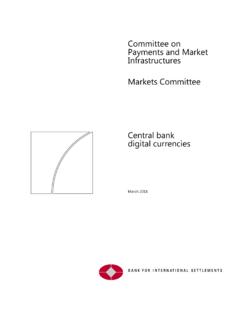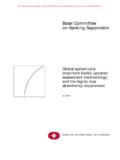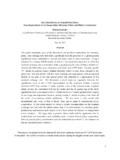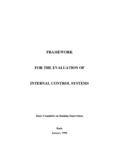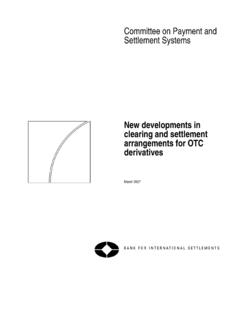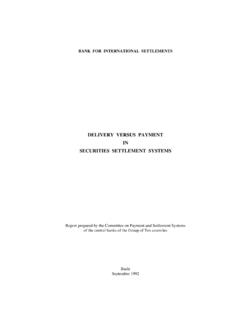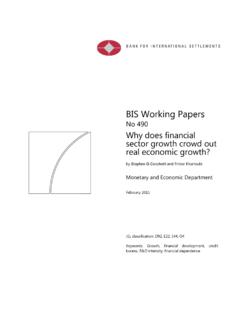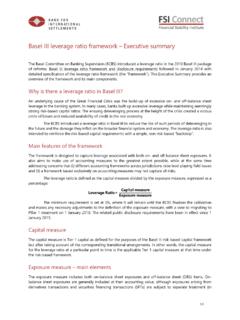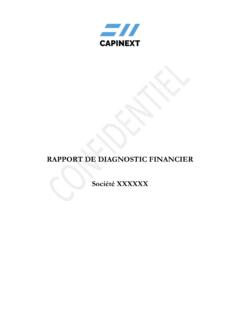Transcription of Basel Committee on Banking Supervision
1 Basel Committee on Banking Supervision Customer due diligence for banks October 2001 Working Group on Cross-border Banking Co-Chairs: Mr Charles Freeland, Deputy Secretary General, Basel Committee on Banking Supervision Mr Colin Powell, Chairman, Offshore Group of Banking Supervisors, and Chairman, Jersey Financial Services Commission Bermuda Monetary Authority Mr D Munro Sutherland Cayman Islands Monetary Authority Mr John Bourbon Mrs Anna McLean Banque de France/Commission Bancaire Mr Laurent Ettori Federal Banking Supervisory Office of Germany Mr Jochen Sanio Mr Peter Kruschel Guernsey Financial Services Commission Mr Peter G Crook (until April 2001) Mr Philip Marr (since April 2001) Banca d Italia Mr Giuseppe Godano Financial Services Agency, Japan Mr Kiyotaka Sasaki (until July 2001) Mr Hisashi Ono (since July 2001) Commission de Surveillance du Secteur Financier, Luxembourg Mr Romain Strock Monetary Authority of Singapore Mrs Foo-Yap Siew Hong Ms Teo Lay Har Swiss Federal Banking Commission Mr Daniel Zuberb hler Ms Dina Balleyguier Financial Services Authority, United Kingdom Mr Richard Chalmers Board of Governors of the Federal Reserve System Mr William Ryback Federal Reserve Bank of New York Ms Nancy Bercovici Office of the Comptroller of the Currency Mr Jose Tuya Ms Tanya Smith Secretariat Mr Andrew Khoo 1 Table of Contents I.
2 Introduction .. 2 II. Importance of KYC standards for supervisors and banks .. 3 III. Essential elements of KYC standards .. 5 1. Customer acceptance policy .. 6 2. Customer 6 General identification 7 Specific identification issues .. 8 Trust, nominee and fiduciary 8 Corporate 8 Introduced 9 Client accounts opened by professional 9 Politically exposed 10 Non-face-to-face 11 Correspondent 12 3. On-going monitoring of accounts and 13 4. Risk management .. 14 IV. The role of 14 V. Implementation of KYC standards in a cross-border context .. 15 Annex 1: Excerpts from Core Principles 18 Annex 2: Excerpts from FATF recommendations .. 20 2 Customer due diligence for banks I. Introduction 1. Supervisors around the world are increasingly recognising the importance of ensuring that their banks have adequate controls and procedures in place so that they know the customers with whom they are dealing.
3 Adequate due diligence on new and existing customers is a key part of these controls. Without this due diligence, banks can become subject to reputational, operational, legal and concentration risks, which can result in significant financial cost. 2. In reviewing the findings of an internal survey of cross-border Banking in 1999, the Basel Committee identified deficiencies in a large number of countries know-your-customer (KYC) policies for banks. Judged from a supervisory perspective, KYC policies in some countries have significant gaps and in others they are non-existent. Even among countries with well-developed financial markets, the extent of KYC robustness varies. Consequently, the Basel Committee asked the Working Group on Cross-border Banking1 to examine the KYC procedures currently in place and to draw up recommended standards applicable to banks in all countries.
4 The resulting paper was issued as a consultative document in January 2001. Following a review of the comments received, the Working Group has revised the paper and the Basel Committee is now distributing it worldwide in the expectation that the KYC framework presented here will become the benchmark for supervisors to establish national practices and for banks to design their own programmes. It is important to acknowledge that supervisory practices of some jurisdictions already meet or exceed the objective of this paper and, as a result, they may not need to implement any changes. 3. KYC is most closely associated with the fight against money-laundering, which is essentially the province of the Financial Action Task Force (FATF).2 It is not the Committee 's intention to duplicate the efforts of the FATF.
5 Instead, the Committee 's interest is from a wider prudential perspective. Sound KYC policies and procedures are critical in protecting the safety and soundness of banks and the integrity of Banking systems. The Basel Committee and the Offshore Group of Banking Supervisors (OGBS) continue to support strongly the adoption and implementation of the FATF recommendations, particularly those relating to banks, and intend the standards in this paper to be consistent with the FATF recommendations. The Committee and the OGBS will also consider the adoption of any higher standards introduced by the FATF as a result of its current review of the 40 Recommendations. Consequently, the Working Group has been and will remain in close contact with the FATF as it develops its thoughts.
6 4. The Basel Committee s approach to KYC is from a wider prudential, not just anti-money laundering, perspective. Sound KYC procedures must be seen as a critical element in the effective management of Banking risks. KYC safeguards go beyond simple account 1 This is a joint group consisting of members of the Basel Committee and of the Offshore Group of Banking Supervisors. 2 The FATF is an inter-governmental body which develops and promotes policies, both nationally and internationally, to combat money laundering. It has 29 member countries and two regional organisations. It works in close cooperation with other international bodies involved in this area such as the United Nations Office for Drug Control and Crime Prevention, the Council of Europe, the Asia-Pacific Group on Money Laundering and the Caribbean Financial Action Task Force.
7 The FATF defines money laundering as the processing of criminal proceeds in order to disguise their illegal origin. 3 opening and record-keeping and require banks to formulate a customer acceptance policy and a tiered customer identification programme that involves more extensive due diligence for higher risk accounts, and includes proactive account monitoring for suspicious activities. 5. The Basel Committee s interest in sound KYC standards originates from its concerns for market integrity and has been heightened by the direct and indirect losses incurred by banks due to their lack of diligence in applying appropriate procedures. These losses could probably have been avoided and damage to the banks reputation significantly diminished had the banks maintained effective KYC programmes.
8 6. This paper reinforces the principles established in earlier Committee papers by providing more precise guidance on the essential elements of KYC standards and their implementation. In developing this guidance, the Working Group has drawn on practices in member countries and taken into account evolving supervisory developments. The essential elements presented in this paper are guidance as to minimum standards for worldwide implementation for all banks. These standards may need to be supplemented and/or strengthened, by additional measures tailored to the risks of particular institutions and risks in the Banking system of individual countries. For example, enhanced diligence is required in the case of higher-risk accounts or for banks that specifically aim to attract high net-worth customers.
9 In a number of specific sections in this paper, there are recommendations for higher standards of due diligence for higher risk areas within a bank, where applicable. 7. The need for rigorous customer due diligence standards is not restricted to banks. The Basel Committee believes similar guidance needs to be developed for all non-bank financial institutions and professional intermediaries of financial services such as lawyers and accountants. II. Importance of KYC standards for supervisors and banks 8. The FATF and other international groupings have worked intensively on KYC issues, and the FATF s 40 Recommendations on combating money-laundering3 have international recognition and application. It is not the intention of this paper to duplicate that work. 9. At the same time, sound KYC procedures have particular relevance to the safety and soundness of banks, in that: they help to protect banks reputation and the integrity of Banking systems by reducing the likelihood of banks becoming a vehicle for or a victim of financial crime and suffering consequential reputational damage; they constitute an essential part of sound risk management ( by providing the basis for identifying, limiting and controlling risk exposures in assets and liabilities, including assets under management).
10 10. The inadequacy or absence of KYC standards can subject banks to serious customer and counterparty risks, especially reputational, operational, legal and concentration risks. It is worth noting that all these risks are interrelated. However, any one 3 See FATF recommendations 10 to 19 which are reproduced in Annex 2. 4 of them can result in significant financial cost to banks ( through the withdrawal of funds by depositors, the termination of inter-bank facilities, claims against the bank, investigation costs, asset seizures and freezes, and loan losses), as well as the need to divert considerable management time and energy to resolving problems that arise. 11. Reputational risk poses a major threat to banks, since the nature of their business requires maintaining the confidence of depositors, creditors and the general marketplace.
